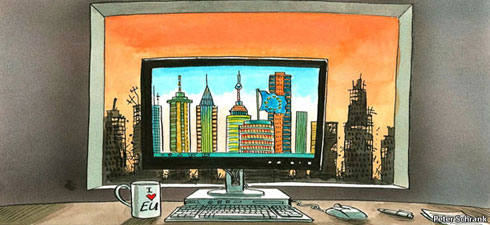Anybody who has played (or watched their children play) life-simulation computer games, such as “SimCity” or “The Sims”, will know how engrossing they can be. Countless hours are spent creating an intricate synthetic world, be it a house or a whole city, inventing characters that speak a nonsense tongue known as Simlish, controlling their actions and sometimes visiting disaster upon them. A similar craze is gripping Brussels: call it SimEurope.
Guido Westerwelle and Radek Sikorski, the foreign ministers of Germany and Poland, have spent much of this year locked away with nine colleagues (almost all boys) engaging in make-believe. This weekthey revealed the fruits of their “Future of Europe Group”. It is a world that includes an elected European president, a more powerful European foreign minister, a European border police and perhaps even a European army. The British spoilsports were not invited.
Just a few days earlier, José Manuel Barroso, president of the European Commission, gave his annual “State of the Union” address and spoke of a future “federation of nation-states”, a notion he has repeated in countless op-ed articles since. Mr Barroso has thus revived the term coined by his predecessor, Jacques Delors, but has not explained what he means by it. He says only that he will present some proposals by 2014.
With his words, Mr Barroso is breaking away from the three other “presidents”—Herman Van Rompuy of the European Council, Mario Draghi of the European Central Bank and Jean-Claude Juncker of the Eurogroup of finance ministers—who are collectivelyplanning a “genuine” economic and monetary union. Having set out the “building blocks” in June, Mr Van Rompuy has now produced an “issues paper” that proposes, among other things, a central euro-zone budget. An interim report may be presented at a summit in October and the final version should be out in December.
In many ways Angela Merkel, the German chancellor, started this craze for make-believe with her calls for a “political union” (including more power for the flawed European Parliament). This is awkward in France, where parties have been deeply divided over Europe since the referendum in 1992 for the Maastricht treaty (approved narrowly) and the one in 2005 for a constitutional treaty (rejected). Yet Pierre Moscovici, the Socialist finance minister, recently uttered the word “federalism”. And François Fillon, the recent conservative prime minister, has proposed a new “pact for Europe” that would include a European finance minister.
Was this article useful? If so we are delighted!
It is freely available because we believe that the right to free and independent information is essential for democracy. But this right is not guaranteed forever, and independence comes at a cost. We need your support in order to continue publishing independent, multilingual news for all Europeans.
Discover our subscription offers and their exclusive benefits and become a member of our community now!












